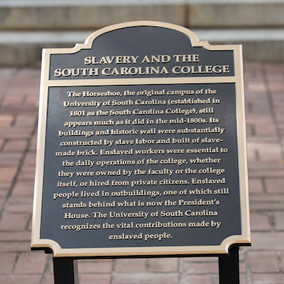 The University of South Carolina has unveiled two historical plaques honoring the enslaved men and women who worked on the campus of what was known then as South Carolina College in the years preceding the Civil War. In addition to a marker that acknowledges the university’s recognition of contributions made on its behalf by enslaved people, a second marker identifies the last remaining kitchen and slave quarters on campus — a brick building located near the southeast corner of the President’s House.
The University of South Carolina has unveiled two historical plaques honoring the enslaved men and women who worked on the campus of what was known then as South Carolina College in the years preceding the Civil War. In addition to a marker that acknowledges the university’s recognition of contributions made on its behalf by enslaved people, a second marker identifies the last remaining kitchen and slave quarters on campus — a brick building located near the southeast corner of the President’s House.
Students in the history department began searching the university’s archives several years ago for evidence of enslaved people used during the campus’ construction and beyond. Combing through receipts and financial reports, the students were able to trace the sources of slave labor that made bricks for the Horseshoe wall, helped construct buildings and assisted with feeding and housing the student body.
Elizabeth West, university archivist, notes that “the college itself had a few slaves, but much of the enslaved labor force was contracted by South Carolina College from private citizens who owned slaves. Faculty members also had their own house slaves who lived in outbuildings behind the faculty residences.”
In commenting on the placing of the plaques in prominent places on campus, John Dozier, chief diversity officer for the university, stated that “we have been inspired by our students to be more thoughtful about how we tell the history of the university and of the state in more complete ways. This is an attempt to do that; the plaques represent the beginning of how we contextualize our past.”










